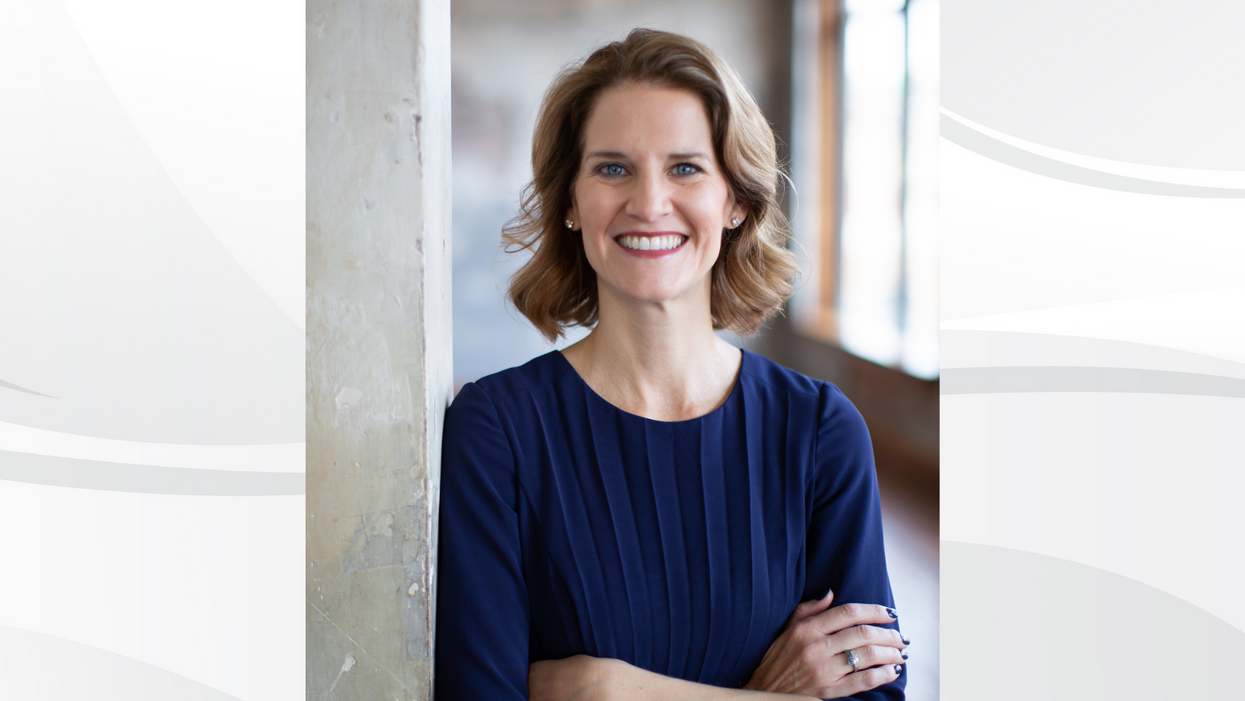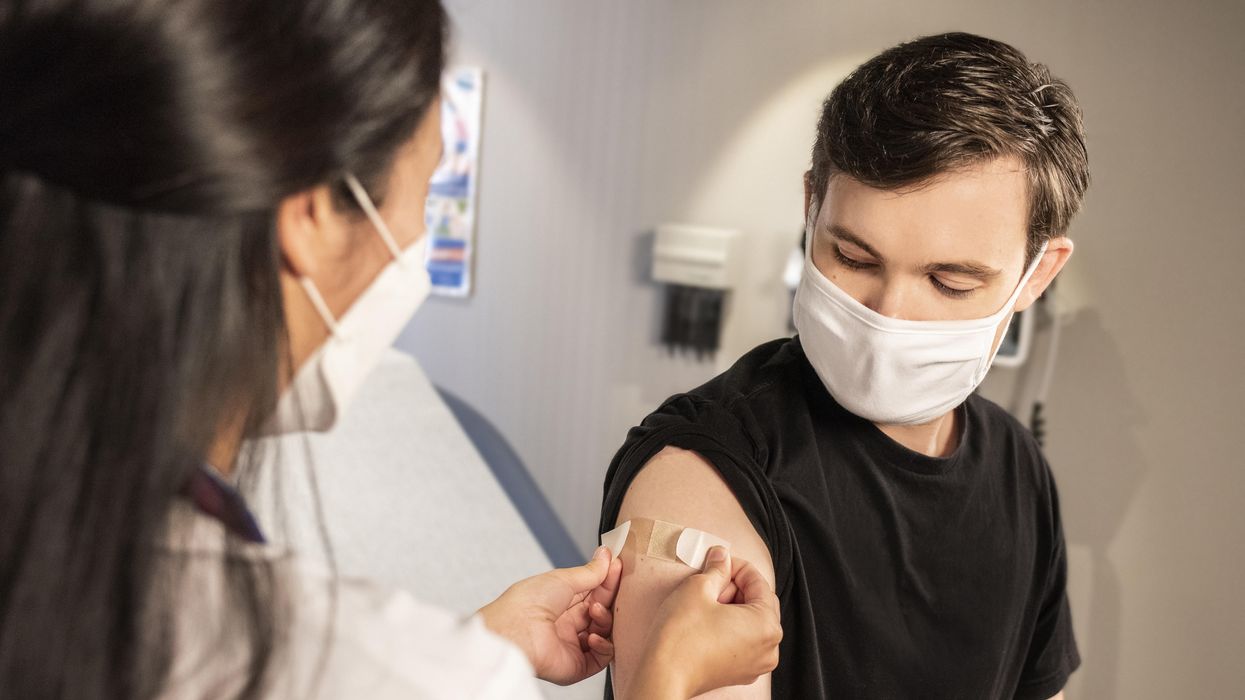New Podcast: Dr. Natasha Burgert Discusses Kids and the Delta Variant

"Making Sense of Science" is a monthly podcast that features interviews with leading medical and scientific experts about the latest developments and the big ethical and societal questions they raise. This episode is hosted by science and biotech journalist Emily Mullin, summer editor of the award-winning science outlet Leaps.org.
Listen to the episode:
Don't Panic Over Waning Antibodies. Here's Why.
A health care worker places a bandaid on the arm of a man who has just been vaccinated.
Since the Delta variant became predominant in the United States on July 7, both scientists and the media alike have been full of mixed messages ("breakthrough infections rare"; "breakthrough infections common"; "vaccines still work"; "vaccines losing their effectiveness") but – if we remember our infectious diseases history- one thing remains clear: immunity is the only way to get through a pandemic.
What Happened in the Past
The 1918 influenza pandemic was far the deadliest respiratory virus pandemic recorded in recent human history with over 50 million deaths (maybe even 100 million deaths, or 3% of the world's population) worldwide. Although they used some of the same measures we are using now (masks, distancing, event closures, as neither testing nor a vaccine existed back then), the deaths slowed only after enough of the population had either acquired immunity through natural infection or died. Indeed, the first influenza vaccine was not developed until 1942, more than 20 years later. As judged by the amount of suffering and death from 1918 influenza (and the deadly Delta surge in India in spring 2021), natural immunity is obviously a terrible way to get through a pandemic.
Similarly, measles was a highly transmissible respiratory virus that led to high levels of immunity among adults who were invariably exposed as children. However, measles led to deaths each year among the nonimmune until a vaccine was developed in 1963, largely restricting current measles outbreaks in the U.S. now to populations who decline to vaccinate. Smallpox also led to high levels of immunity through natural infection, which was often fatal. That's why unleashing smallpox on a largely nonimmune population in the New World was so deadly. Only an effective vaccine – and its administration worldwide, including among populations who declined smallpox vaccine at first via mandates – could control and then eventually eradicate smallpox from Earth.
Fully vaccinated people are already now able to generate some antibodies against all the variants we know of to date, thanks to their bank of memory B cells.
The Delta variant is extremely transmissible, making it unlikely we will ever eliminate or eradicate SARS-CoV-2. Even Australia, which had tried to maintain a COVID-zero nation with masks, distancing, lockdowns, testing and contact tracing before and during the vaccines, ended a strategy aimed at eliminating COVID-19 this week. But, luckily, since highly effective and safe vaccines were developed for COVID-19 less than a year after its advent on a nonimmune population and since vaccines are retaining their effectiveness against severe disease, we have a safe way out of the misery of this pandemic: more and more immunity. "Defanging" SARS-CoV-2 and stripping it of its ability to cause severe disease through immunity will relegate it to the fate of the other four circulating cold-causing coronaviruses, an inconvenience but not a world-stopper.
Immunity Is More Than Antibodies
When we say immunity, we have to be clear that we are talking about cellular immunity and immune memory, not only antibodies. This is a key point. Neutralizing antibodies, which prevent the virus from entering our cells, are generated by the vaccines. But those antibodies will necessarily wane over time since we cannot keep antibodies from every infection and vaccine we have ever seen in the bloodstream (or our blood would be thick as paste!). Vaccines with shorter intervals between doses (like Pfizer vaccines given 3 weeks apart) are likely to have their antibodies wane sooner than vaccines with longer intervals between doses (like Moderna), making mild symptomatic breakthroughs less likely with the Moderna vaccine than the Pfizer during our Delta surge, as a recent Mayo Clinic study showed.
Luckily, the vaccines generate B cells that get relegated to our memory banks and these memory B cells are able to produce high levels of antibodies to fight the virus if they see it again. Amazingly, these memory B cells will actually produce antibodies adapted against the COVID variants if they see a variant in the future, rather than the original antibodies directed against the ancestral strain. This is because memory B cells serve as a blueprint to make antibodies, like the blueprint of a house. If a house needs an extra column (or antibodies need to evolve to work against variants), the blueprint will oblige just as memory B cells will!
One problem with giving a 3rd dose of our current vaccines is that those antibodies won't be adapted towards the variants. Fully vaccinated people are already now able to generate some antibodies against all the variants we know of to date, thanks to their bank of memory B cells. In other words, no variant has evolved to date that completely evades our vaccines. Memory B cells, once generated by either natural infection or vaccination, should be long-lasting.
If memory B cells are formed by a vaccine, they should be as long-lasting as those from natural infection per various human studies. A 2008 Nature study found that survivors of the 1918 influenza pandemic were able to produce antibodies from memory B cells when exposed to the same influenza strain nine decades later. Of note, mild infections (such as the common cold from the cold-causing coronaviruses called 229E, NL63, OC43, and HKU1) may not reliably produce memory B cell immunity like more severe infections caused by SARS-CoV-2.
Right about now, you may be worrying about a super-variant that might yet emerge to evade all our hard-won immune responses. But most immunologists do not think this is very realistic because of T cells. How are T cells different from B Cells? While B cells are like the memory banks to produce antibodies when needed (helped by T cells), T cells will specifically amplify in response to a piece of the virus and help recruit cells to attack the pathogen directly. We likely have T cells to thank for the vaccine's incredible durability in protecting us against severe disease. Data from La Jolla Immunology Institute and UCSF show that the T cell response from the Pfizer vaccine is strong across all the variants.
Think of your spike protein as being comprised of 100 houses with a T cell there to cover each house (to protect you against severe disease). The variants have around 13 mutations along the spike protein so 13 of those T cells won't work, but there are over 80 T cells remaining to protect your "houses" or your body against severe disease.
Although these are theoretical numbers and we don't know exactly the number of T cell antigens (or "epitopes") across the spike protein, one review showed 1400 across the whole virus, with many of those in the spike protein. Another study showed that there were 87 epitopes across the spike protein to which T cells respond, and mutations in one of the variants (beta) took those down to 75. The virus cannot mutate indefinitely in its spike protein and still retain function. This is why it is unlikely we will get a variant that will evade the in-breadth, robust response of our T cells.
Where We Go From Here
So, what does this mean for getting through this pandemic? Immunity and more immunity. For those of us who are vaccinated, if we get exposed to the Delta variant, it will boost our immune response although the memory B cells might take 3-5 days to make new antibodies, which can leave us susceptible to a mild breakthrough infection. That's part of the reason the CDC put back masks for the vaccinated in late July. For those who are unvaccinated, immunity will be gained from Delta but often through terrible ways like severe disease.
The way for the U.S. to determine the need for 3rd shots among those who are not obviously immunocompromised, given the amazing immune memory generated by the vaccines among immunocompetent individuals, is to analyze the cases of the ~6000 individuals who have had severe breakthrough infections among the 171 million Americans fully vaccinated. Define their co-morbidities and age ranges, and boost those susceptible to severe infections (examples could include older people, those with co-morbidities, health care workers, and residents of long-term care facilities). This is an approach likely to be taken by the CDC's Advisory Committee on Immunization Practices.
If immunity is the only way to get through the pandemic and if variants are caused mostly by large populations being unvaccinated, there is not only a moral and ethical imperative but a practical imperative to vaccinate the world in order to keep us all safe. Immunocompetent Americans can boost their antibodies, which may enhance their ability to avoid mild breakthrough infections, but the initial shots still work well against the most important outcomes: hospitalizations and deaths.
There has been no randomized, controlled trial to assess whether three shots vs. two shots meaningfully improve those outcomes. While we ought to trust immune memory to get the immunocompetent in the United States through, we can hasten the end of this pandemic by providing surplus vaccines to poor countries to combat severe disease. Doing so would not only revitalize the role of the U.S. as a global health leader – it would save countless lives.
New Options Are Emerging in the Search for Better Birth Control
A decade ago, Elizabeth Summers' options for birth control suddenly narrowed. Doctors diagnosed her with Factor V Leiden, a rare genetic disorder, after discovering blood clots in her lungs. The condition increases the risk of clotting, so physicians told Summers to stay away from the pill and other hormone-laden contraceptives. "Modern medicine has generally failed to provide me with an effective and convenient option," she says.
But new birth control options are emerging for women like Summers. These alternatives promise to provide more choices to women who can't ingest hormones or don't want to suffer their unpleasant side effects.
These new products have their own pros and cons. Still, doctors are welcoming new contraceptives following a long drought in innovation. "It's been a long time since we've had something new in the world of contraception," says Heather Irobunda, an obstetrician and gynecologist at NYC Health and Hospitals.
On social media, Irobunda often fields questions about one of these new options, a lubricating gel called Phexxi. San Diego-based Evofem, the company behind Phexxi, has been advertising the product on Hulu and Instagram after the gel was approved by the Food and Drug Administration in May 2020. The company's trendy ads target women who feel like condoms diminish the mood, but who also don't want to mess with an IUD or hormones.
Here's how it works: Phexxi is inserted via a tampon-like device up to an hour before sex. The gel regulates vaginal pH — essentially, the acidity levels — in a range that's inhospitable to sperm. It sounds a lot like spermicide, which is also placed in the vagina prior to sex to prevent pregnancy. But spermicide can damage the vagina's cell walls, which can increase the risk of contracting sexually transmitted diseases.
"Not only is innovation needed, but women want a non-hormonal option."
Phexxi isn't without side effects either. The most common one is vaginal burning, according to a late-stage trial. It's also possible to develop a urinary tract infection while using the product. That same study found that during typical use, Phexxi is about 86 percent effective at preventing pregnancy. The efficacy rate is comparable to condoms but lower than birth control pills (91 percent) and significantly lower than an IUD (99 percent).
Phexxi – which comes in a pack of 12 – represents a tiny but growing part of the birth control market. Pharmacies dispensed more than 14,800 packs from April through June this year, a 65 percent increase over the previous quarter, according to data from Evofem.
"We've been able to demonstrate that not only is innovation needed, but women want a non-hormonal option," says Saundra Pelletier, Evofem's CEO.
Beyond contraception, the company is carrying out late-stage tests to gauge Phexxi's effectiveness at preventing the sexually transmitted infections chlamydia and gonorrhea.

Phexxi is inserted via a tampon-like device up to an hour before sex.
Phexxi
A New Pill
The first birth control pill arrived in 1960, combining the hormones estrogen and progestin to stop sperm from joining with an egg, giving women control over their fertility. Subsequent formulations sought to ease side effects, by way of lower amounts of estrogen. But some women still experience headaches and nausea – or more serious complications like blood clots. On social media, women recently noted that birth control pills are much more likely to cause blood clots than Johnson & Johnson's COVID-19 vaccine that was briefly paused to evaluate the risk of clots in women under age 50. What will it take, they wondered, for safer birth control?
Mithra Pharmaceuticals of Belgium sought to create a gentler pill. In April, the FDA approved Mithra's Nextstellis, which includes a naturally occurring estrogen, the first new estrogen in the U.S. in 50 years. Nextstellis selectively acts on tissues lining the uterus, while other birth control pills have a broader target.
A Phase 3 trial showed a 98 percent efficacy rate. Andrew London, an obstetrician and gynecologist, who practices at several Maryland hospitals, says the results are in line with some other birth control pills. But, he added, early studies indicate that Nextstellis has a lower risk of blood clotting, along with other potential benefits, which additional clinical testing must confirm.
"It's not going to be worse than any other pill. We're hoping it's going to be significantly better," says London.
The estrogen in Nexstellis, called estetrol, was skipped over by the pharmaceutical industry after its discovery in the 1960s. Estetrol circulates between the mother and fetus during pregnancy. Decades later, researchers took a new look, after figuring out how to synthesize estetrol in a lab, as well as produce estetrol from plants.
"That allowed us to really start to investigate the properties and do all this stuff you have to do for any new drug," says Michele Gordon, vice president of marketing in women's health at Mayne Pharma, which licensed Nextstellis.
Bonnie Douglas, who followed the development of Nextstellis as part of a search for better birth control, recently switched to the product. "So far, it's much more tolerable," says Douglas. Previously, the Midwesterner was so desperate to find a contraceptive with fewer side effects that she turned to an online pharmacy to obtain a different birth control pill that had been approved in Canada but not in the U.S.
Contraceptive Access
Even if a contraceptive lands FDA approval, access poses a barrier. Getting insurers to cover new contraceptives can be difficult. For the uninsured, state and federal programs can help, and companies should keep prices in a reasonable range, while offering assistance programs. So says Kelly Blanchard, president of the nonprofit Ibis Reproductive Health. "For innovation to have impact, you want to reach as many folks as possible," she says.
In addition, companies developing new contraceptives have struggled to attract venture capital. That's changing, though.
In 2015, Sabrina Johnson founded DARÉ Bioscience around the idea of women's health. She estimated the company would be fully funded in six months, based on her track record in biotech and the demand for novel products.
But it's been difficult to get male investors interested in backing new contraceptives. It took Johnson two and a half years to raise the needed funds, via a reverse merger that took the company public. "There was so much education that was necessary," Johnson says, adding: "The landscape has changed considerably."
Johnson says she would like to think DARÉ had something to do with the shift, along with companies like Organon, a spinout of pharma company Merck that's focused on reproductive health. In surveying the fertility landscape, DARÉ saw limited non-hormonal options. On-demand options – like condoms – can detract from the moment. Copper IUDs must be inserted by a doctor and removed if a woman wants to return to fertility, and this method can have onerous side effects.
So, DARÉ created Ovaprene, a hormone-free device that's designed to be inserted into the vagina monthly by the user. The mesh product acts as a barrier, while releasing a chemical that immobilizes sperm. In an early study, the company reported that Ovaprene prevented almost all sperm from entering the cervical canal. The results, DARÉ believes, indicate high efficacy.
A late-stage study, slated to kick off next year, will be the true judge. Should Ovaprene eventually win regulatory approval, drug giant Bayer will handle commercializing the device.
Other new forms of birth control in development are further out, and that's assuming they perform well in clinical trials. Among them: a once-a-month birth control pill, along with a male version of the birth control pill. The latter is often brought up among women who say it's high time that men take a more proactive role in birth control.
For Summers, her search for a safe and convenient birth control continues. She tried Phexxi, which caused irritation. Still, she's excited that a non-hormonal option now exists. "I'm sure it will work for others," she says.

